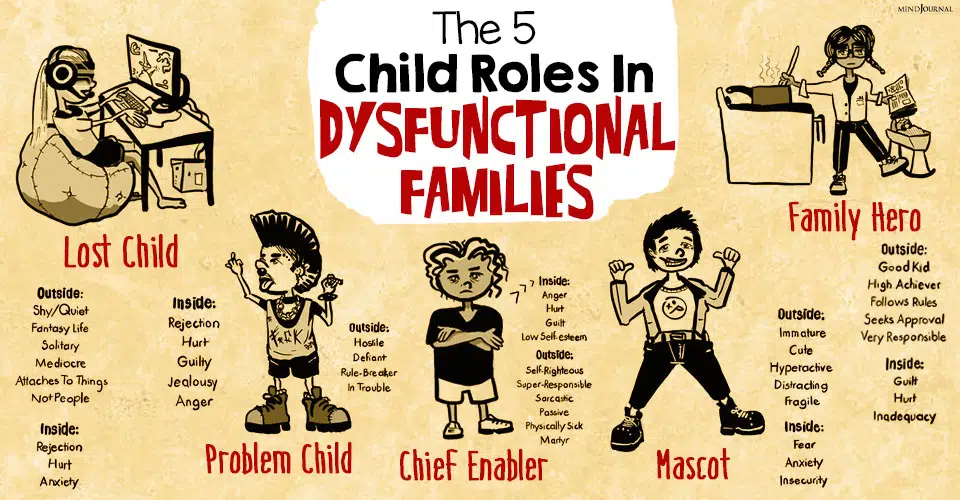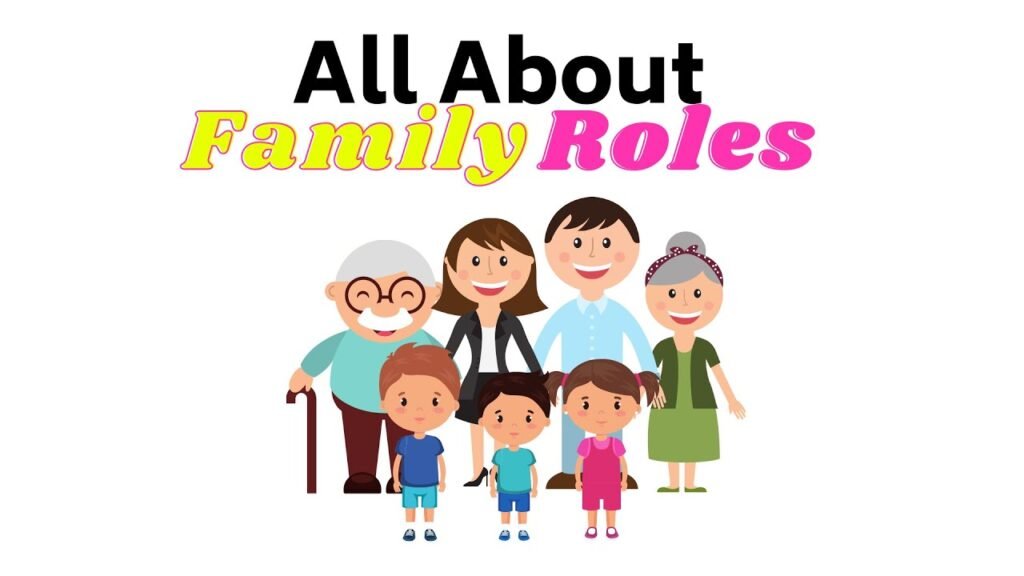Family roles refer to the various positions and responsibilities that each family member assumes within the household. These roles can be positive or negative and can shift over time.
Common roles in dysfunctional families include the hero, scapegoat, lost child, mascot, caretaker/enabler, and golden child. Children are also expected to fulfill certain roles within the family, such as being a devoted child, helping with household chores, studying, and maintaining good relationships with siblings.
As family members age, they may take on additional roles such as becoming a spouse, parent, or grandparent. Understanding family roles is important for healthy family functioning and can help identify and address any issues or dysfunctions within the family unit.
Table of Contents
ToggleIntroduction To Family Roles
Family roles play a crucial part in the dynamics of a family. Parents are expected to provide, teach, and discipline their children, while children are expected to respect and cooperate with their parents. As family members age, they take on additional roles such as becoming a spouse, parent, or grandparent.
Understanding these roles helps in maintaining a healthy family environment.
The Importance Of Roles In Family Dynamics
Family roles play a crucial role in shaping the dynamics and functioning of a family unit. These roles help establish a sense of order, structure, and responsibility within the family. Each member has their own unique role to fulfill, contributing to the overall balance and harmony of the family system.
By assigning roles, families can distribute tasks and responsibilities, ensuring that essential functions are fulfilled. This division of labor promotes cooperation, teamwork, and a sense of belonging among family members. It also helps establish clear expectations and boundaries, allowing for smoother communication and decision-making processes.
Moreover, family roles contribute to the development of individual identities and self-esteem. When each member has a defined role, they have a sense of purpose and contribution to the family unit. This fosters a sense of self-worth and fulfillment, promoting positive mental health and emotional well-being.
Overview Of Common Family Roles
Family roles can vary from one family to another, depending on cultural, societal, and personal factors. However, there are several common family roles that are often observed:
- The Hero: This role is typically taken on by the responsible and high-achieving family member. They often strive for success and take on leadership roles within the family.
- The Scapegoat: The scapegoat is the family member who is often blamed for any issues or conflicts within the family. They may exhibit rebellious or disruptive behavior as a way of expressing underlying family problems.
- The Lost Child: The lost child tends to be quiet, withdrawn, and avoids conflict. They may feel invisible within the family and often seek solace in solitude.
- The Mascot: The mascot is the family member who uses humor and playfulness to diffuse tension and bring joy to the family. They often lighten the mood and provide comic relief.
- The Addict: The addict role is often taken on by a family member who struggles with substance abuse or addictive behaviors. Their behavior and addiction may become a focal point within the family system.
- The Enabler: The enabler is the family member who supports and enables the dysfunctional behaviors of other family members. They may make excuses or cover up for the actions of the addict or other troubled family members.
These roles are not fixed or permanent, and individuals may shift between roles over time. It is essential to recognize and understand these roles to identify patterns of dysfunction and work towards healthier family dynamics.
Credit: www.researchgate.net
The Hero: The Pillar Of Strength
The Hero is often seen as the pillar of strength within the family unit, embodying characteristics that make them a source of reliability and support for their loved ones. They are typically responsible, dependable, and often take on a leadership role within the family dynamic.
Characteristics And Expectations
The Hero exhibits traits such as responsibility, reliability, and leadership. They are expected to provide emotional stability, guidance, and support for other family members, often prioritizing the needs of the family above their own.
Impact On Family Dynamics
The presence of the Hero can significantly influence the overall family dynamics. Their leadership and support can foster a sense of security and unity within the family, creating a positive environment for growth and development. However, the burden of always being the strong one can sometimes lead to feelings of pressure and overwhelm for the Hero.
The Scapegoat: The Family’s Outlet
The Scapegoat: The Family’s Outlet delves into the complex dynamics of family roles. It explores the commonly agreed upon roles such as the Hero, Scapegoat, Lost Child, Mascot, Caretaker/Enabler, and Golden Child, highlighting how these roles can shift over time within a family.
Discover the impact these roles have on family functioning and the challenges they present.
Understanding The Scapegoat’s Burden
The Scapegoat is a crucial role within the family dynamic, serving as the family’s outlet for blame and frustration. This individual often becomes the target of criticism, accusations, and blame for the family’s problems and conflicts. They bear the burden of carrying the family’s emotional baggage, absorbing the negative energy that arises within the family.
This role is typically assigned to a family member who is perceived as different or problematic in some way. The Scapegoat may be the one who challenges the family’s values, questions authority, or exhibits behaviors that go against the family’s expectations.
The Scapegoat often carries the weight of the family’s dysfunction, feeling responsible for the problems and conflicts that arise. They may internalize the blame, believing that they are the cause of the family’s issues.
Navigating Blame And Responsibility
Being the Scapegoat can be incredibly challenging, as the individual is constantly under scrutiny and criticism. They may feel isolated, misunderstood, and unfairly treated by other family members.
It is important for the Scapegoat to recognize that they are not solely responsible for the family’s problems. It is a shared responsibility, and each family member plays a role in the dynamics and conflicts that arise.
One way to navigate the blame and responsibility is by setting healthy boundaries. The Scapegoat can establish boundaries to protect themselves from absorbing the negativity and blame from others. This can involve distancing themselves emotionally, seeking support from outside sources, and practicing self-care.
Additionally, therapy can be beneficial for the Scapegoat to address and process the emotional baggage they have carried for so long. Therapy can provide a safe space to explore their feelings, gain perspective, and develop coping mechanisms to navigate the challenges of their role within the family.
It is important for family members to recognize the impact of the Scapegoat role and work towards shifting the dynamics within the family. This can involve open communication, empathy, and understanding. By acknowledging and addressing the underlying issues, the family can create a healthier and more supportive environment for all members.

Credit: www.researchgate.net
The Lost Child: The Silent Observer
The Lost Child often assumes the role of the silent observer within the family dynamic. This individual tends to withdraw from interactions and may be overshadowed by the more outspoken family members. The Lost Child often copes with family challenges by seeking solace in solitude, becoming a silent observer to the family’s dynamics, and often feeling overlooked or ignored.
Traits Of The Lost Child
- Withdraws from family interactions
- Seeks solace in solitude
- Feels overlooked or ignored
- Often silent and observant
The Role’s Effect On Personal Growth
The role of the Lost Child can have a significant impact on personal growth. Isolation and invisibility can hinder the individual’s ability to develop social skills and assertiveness. This can lead to challenges in forming meaningful relationships and expressing one’s own needs and desires. The silent observation may lead to a heightened sense of empathy and introspection, but it can also result in emotional detachment and difficulty in seeking support.
The Mascot: Lightening The Mood
Lightening the Mood, the Mascot plays a crucial role in the family dynamic, often using humor to ease tension and bring joy. This lighthearted approach can help create a positive atmosphere and strengthen family bonds.
The Mascot’s Role In Easing Tensions
Families are complex, and often there are tensions and conflicts that arise. This is where the Mascot comes in – they are the family member who uses humor to lighten the mood and ease tensions. The Mascot is usually the family clown, and their role is important in maintaining emotional health within the family unit.Balancing Humor And Emotional Health
The Mascot’s role in easing tensions is not just about cracking jokes. They must strike a balance between using humor to diffuse difficult situations and being sensitive to the emotional needs of their family members. It’s important for the Mascot to be aware of the boundaries and not use humor as a means of avoiding or minimizing serious issues. In conclusion, the Mascot plays a crucial role in maintaining emotional health within the family unit. They use humor to lighten the mood and ease tensions, but also must be aware of the emotional needs of their family members. Balancing humor and emotional health is key, and the Mascot must use their role wisely to ensure that the family unit stays healthy and happy.The Caretaker: Nurturing The Family
Every family has a caretaker, someone who takes on the responsibility of nurturing and caring for everyone else. The caretaker often puts the needs of others before their own, and their role is crucial in maintaining the emotional well-being of the family. In this article, we will explore the responsibilities of the caretaker and the emotional weight that comes with their role.
Responsibilities Of The Caretaker
The caretaker has a wide range of responsibilities within the family. They are often the primary caregiver for children or elderly relatives and take on the bulk of the household chores. The caretaker also plays an important role in maintaining the emotional health of the family, providing support and comfort during difficult times.
Here are some of the key responsibilities of the caretaker:
- Cooking and preparing meals
- Cleaning and maintaining the household
- Providing emotional support and comfort
- Taking care of children or elderly relatives
- Managing finances and budgeting
These responsibilities can be overwhelming, and the caretaker must often balance their own needs with the needs of others.
The Emotional Weight Of Caretaking
Caretaking can be emotionally taxing, and the caretaker often experiences a range of emotions, including stress, anxiety, and exhaustion. The caretaker may feel isolated and unsupported, as their role can be thankless and goes unrecognized.
It is important for the caretaker to prioritize their own emotional well-being, seeking support and taking time for self-care. This can include talking to a therapist, practicing mindfulness, or engaging in activities they enjoy.
In conclusion, the caretaker plays a crucial role in nurturing and caring for the family. Their responsibilities are vast, and the emotional weight of their role can be heavy. It is important to recognize and appreciate the caretaker’s contributions and support them in maintaining their own emotional well-being.
The Enabler: Supporting Unhealthy Dynamics
Families often have individuals who take on specific roles that contribute to the overall family dynamic. One such role is that of the enabler, who unknowingly supports unhealthy patterns within the family unit. Understanding the role of the enabler is crucial in identifying and addressing dysfunctional family dynamics.
Defining The Enabler’s Role
The enabler in a family system is typically someone who unintentionally allows and even encourages the dysfunctional behavior of another family member. This can manifest in various ways, such as covering up for the actions of the individual with unhealthy habits or making excuses for their behavior.
Consequences Of Enabling Behavior
Enabling behavior can have detrimental effects on both the individual being enabled and the family as a whole. It perpetuates the cycle of dysfunction and prevents the individual from taking responsibility for their actions. Additionally, it can lead to strained relationships and a lack of accountability within the family unit.

Credit: themindsjournal.com
Role Shifts And Their Impact
The roles within a family can have a significant impact on family dynamics. The commonly agreed upon roles include the hero, scapegoat, lost child, mascot, caretaker/enabler, and golden child, and these roles can shift over time. Understanding family roles can help address dysfunction and improve communication within families.
Family roles play a crucial role in shaping the dynamics and functioning of a family. These roles are not fixed and can evolve over time, leading to role shifts within the family unit. Role shifts occur when individuals take on new responsibilities or roles within the family, which can have a significant impact on the family dynamics. Let’s explore how family roles evolve over time and how individuals adapt to these new family dynamics.
How Family Roles Evolve Over Time
Family roles are not static and can change as individuals grow and develop within the family unit. Initially, parents are expected to take on the primary roles of teaching, disciplining, and providing for their children. Children, on the other hand, are expected to cooperate and respect their parents. However, as family members age, they naturally take on additional roles such as becoming a spouse, parent, or grandparent.
These role shifts are often influenced by life events such as marriage, the birth of a child, or the passing of a loved one. For example, a child who was once the center of attention may now have to adjust to the role of an older sibling or become a caretaker for their aging parents. These shifts can bring about both positive and negative changes within the family, as individuals adapt to their new roles and responsibilities.
Adapting To New Family Dynamics
When family roles shift, individuals must adapt to the new family dynamics. This process can be challenging, as it requires individuals to redefine their identities and navigate unfamiliar responsibilities. Adapting to new family dynamics involves learning new skills, adjusting expectations, and finding ways to effectively communicate and collaborate with other family members.
Open and honest communication plays a crucial role in successfully adapting to new family dynamics. By expressing their needs, concerns, and expectations, family members can work together to find solutions and create a supportive environment. It is also important to acknowledge and appreciate the efforts of each family member as they navigate their new roles.
Additionally, seeking external support such as family counseling or therapy can be beneficial in facilitating the transition and fostering healthy family dynamics. A professional can provide guidance, tools, and strategies to help family members navigate the challenges that come with role shifts.
In conclusion, family roles are not fixed and can evolve over time. Role shifts within the family unit can have a significant impact on the dynamics and functioning of the family. By understanding how family roles evolve and adapt to new family dynamics, individuals can navigate these changes more effectively and foster healthy relationships within the family.
Strengthening Family Bonds Through Role Understanding
Understanding family roles is crucial for building strong family bonds. Each family member plays a unique part in shaping the dynamics and functioning of the family unit. By comprehending and embracing these roles, families can foster a deeper connection and mutual respect, leading to a harmonious and supportive environment.
Improving Communication
Effective communication is vital for reinforcing family bonds. When each member understands their role, it becomes easier to communicate openly and honestly. Clear communication helps in expressing expectations, resolving conflicts, and fostering a sense of belonging within the family.
Encouraging Healthy Role Development
Encouraging the development of healthy family roles is essential for the overall well-being of the family. Supporting each member in their designated role and providing opportunities for personal growth can lead to a balanced and cohesive family structure. It also helps in promoting individual strengths and contributions within the family.
Frequently Asked Questions
What Are The Roles In The Family?
Family roles include parents who teach, discipline, and provide for their children, while children are expected to respect and cooperate with their parents. As family members age, they take on additional roles such as becoming a spouse, parent, or grandparent.
Dysfunctional family roles can include Hero, Scapegoat, Lost Child, Mascot, Caretaker/Enabler, and Golden Child. These roles can shift over time.
What Are The Five Primary Roles Of A Family?
The five primary roles of a family are providing support, nurturing, guidance, love, and stability.
What Are The Family Roles In Psychology?
In psychology, there are several family roles that can exist within a family. These roles include the Hero, Scapegoat, Lost Child, Mascot, Caretaker/Enabler, and Golden Child. The roles can shift over the lifespan of the family.
What Are The Five Roles Of Children In A Family?
The five roles of children in a family include being a devoted child, helping with household chores, studying, seeking permission from parents, and maintaining good relationships with siblings. Children also show love and affection towards parents and listen to their advice.
These roles contribute to the functioning and harmony of the family unit.
Conclusion
Family roles play a crucial part in shaping individuals’ identities and behaviors. From the hero to the scapegoat, each role influences family dynamics. Understanding these roles can help identify and address dysfunctional patterns, leading to healthier relationships and improved family functioning.
Embracing diverse roles fosters a supportive and harmonious family environment.


